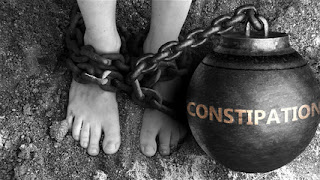TOP 10 Side Effects of Constipation
CatherineStack2022
Constipation affects more than 25% of the world's population and most suffer silently or worse, do not realize that they are constipated. By definition, constipation is defined as having less than three bowel movements weekly (Mayo Clinic, 2018). As someone who has been working with constipated individuals for more than 15 years, I find that definition to be horrifying. How do you eat two, three, or even four times a day and poop maybe 3 times per week? Ouch! I cringe at the thought of this.
Constipation can wreak havoc on your overall health and can actually be the root cause of other disease processes. Constipated individuals are lacking when it comes to toxin removal. This may lead to a variety of toxic build-up as well as hormone imbalance as excess hormones are excreted in the stool. Unhealthy bacteria, fungus, and parasites tend to thrive in a constipated colon. This makes it hard for beneficial bacteria to dominate and support your immune system. Structural abnormalities (distention from fecal impaction) and excessive straining can lead to loss of function (peristalsis) and the formation of hemorrhoids. Those suffering from hemorrhoids are almost always constipated whether they know it or not.
Here are some side effects you may not associate with being constipated.
FATIGUE
Fatigue and constipation go hand in hand. Fermentation of carbohydrates and the production of smelly gasses are thought to have a negative impact on the mitochondria which are the energy producers within our cells. If there is a lack of healthy flora in the gut, nutrient absorption is not optimal and impaired detoxification will impact energy levels and cause fatigue.
WEIGHT GAIN
Yes, a buildup of excess poop will add a few extra pounds to the scale as anyone who has ever done colonic irrigation or an enema can attest to. But weight gain has also been linked to an imbalance of intestinal flora as well as hormone imbalance. Estrogen excess, due to the inability to clear via healthy bowel movements, can contribute to a growing waistline.
SKIN ISSUES
Acne and breakouts are often the result of toxins being reabsorbed via the colon and then entering the bloodstream rather than leaving the body. These toxins then attempt to leave the body via the skin which is your largest organ of detoxification. One study out of Russia demonstrated that 54% of individuals suffering from acne vulgaris had significantly altered gut flora. There is a case for beauty beginning in the gut as aestheticians are now paying attention to.
ANXIETY & DEPRESSION
Mood and anxiety disorders have long been associated with constipation and other gastrointestinal disorders. And while constipation is often thought to be the symptom, recent neuroscientific research has begun to show the importance of intestinal flora in the development of brain symptoms. Stated simply, a constipated colon equates to a constipated brain/mood.
SIBO (Small Intestinal Bacterial Overgrowth)
You may have never heard of SIBO before but it can be a debilitating gut issue that is finally being recognized and treated. SIBO is defined as an increased number and/or abnormal type of bacteria in the small intestine. While bacteria are normally found in huge numbers in the large intestine, they don’t belong in the small intestine. Constipation is one of the top causes of SIBO and is thought to be responsible for up to 80% of IBS (Irritable Bowel Syndrome) cases.
BRITTLE NAILS & THINNING HAIR
This may not be as notable as some of the other symptoms but nutrient absorption is a must when it comes to hair and nails. A constipated colon or individuals suffering from SIBO do not adequately absorb nutrients.
POOR IMMUNITY
There are hundreds of studies that demonstrate intestinal flora (healthy bacteria) is responsible for much of the body’s immune response. Constipation is often associated with pathogen overgrowth (unhealthy bacteria, fungus, and parasitic types) and a lack of healthy bacteria. The impact on your immune system can be significant. The toxic buildup and inflammation associated with constipation can also impair the immune system and leave you vulnerable to many infections.
INCREASED RISK FOR HEMORRHOIDS, RECTAL PROLAPSE, AND ANAL FISSURES.
Constipation may also contribute to or cause issues that may lead to surgical procedures that are not at all pleasant. Hard stools and increased intra-abdominal pressure are thought to add extra pressure to the veins around the anus and increase the risk of hemorrhoids. The connective tissue around the anus can also weaken, leading to rectal prolapse, a condition in which the rectum protrudes through the anus. And, passing hard or large stools can cause anal fissures, which are small tears in the skin of the anus that are painful and difficult to heal.
FECAL IMPACTION
Fecal impaction is an extreme version of constipation that literally obstructs the colon allowing only liquid stool to pass. This is often mistakenly described as diarrhea. Fecal impaction is a very serious issue that may lead to perforation or necrosis of the bowel.
Maybe having a bowel movement three times per week will keep you out of harm's way, but I would make every effort to move daily if vibrant health is a priority for you. Visit www.ConstipationClinic.com for more information.



Comments
Post a Comment